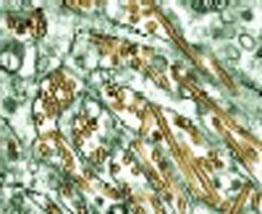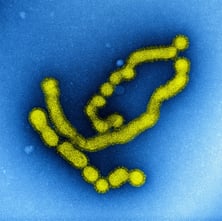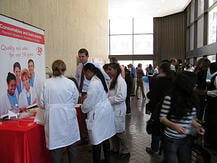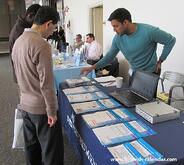Most people don’t think of the flu as being life threatening. However, 36,000 American’s die because of the flu virus each year. Now, with the help of millions in NIH research funding, scientists at Rockefeller University have devised a strategy for improving existing flu vaccines. The new vaccines will better protect people against these ever-mutating viruses. And this new strategy might eliminate the need for annual flu shots, while at the same time saving thousands of lives.


(Images of the Avian and swine flu virus courtesy of wikimedia)
Flu viruses are numerous, diverse, and constantly changing, making them difficult targets for vaccines. That’s because the vaccines contain proteins from specific viral strains, which prime the immune system to respond to those strains. Currently, vaccines only protect against three or four specific strains of flu. Experts must accurately predict which ones will be in circulation during a particular flu season for the vaccine to be effective. Additionally, these vaccines offer little or no protection against pandemic flu viruses, which arises when viruses residing in animals acquire the ability to spread rapidly between people.
In earlier experiments, the researchers at Rockefeller University found that the people who responded the best to the flu vaccine produced high levels of immune proteins, called antibodies, that contained an important change to their structure. Rather than directly fighting the virus, these altered antibodies act as signals. They prompt the immune system to produce other antibodies that are especially good at latching onto, and disabling, the pathogen.
Recently, these scientists successfully altered a regular seasonal vaccine to defend mice against two additional flu strains by using similarly altered antibodies. It is important to note, one of those viruses had the potential to erupt into a global outbreak. This new and improved vaccine protected mice against viruses it did not contain. This including a strain of the seasonal virus known as H1N1; it also included a strain of H5N1, a bird virus with the potential to cause pandemic disease. The researchers say this is an important step toward a single, “universal” vaccine that protects against all the myriad viruses that cause flu.
“We have a simple, direct strategy for developing a broadly protective influenza vaccine,” said Taia T. Wang, in an article for Rockefeller University’s News site. Wang conducted the research as an instructor in clinical investigation at the University’s Leonard Wagner Laboratory Of Molecular Genetics And Immunology.
If Rockefeller researchers successfully expand the coverage afforded by their altered vaccines, it could make annual shots a thing of the past. In order to achieve that goal, the researchers now plan to test their approach against yet more branches of the vast flu family.
“A very reasonable goal might be to provide protection over five to ten flu seasons, with some protection against pandemic strains as well,” says Wang. “But a true universal influenza vaccine may also be attainable--and that is, of course, our objective.”
Jeffrey V. Ravetch, M.D., Ph.D. is the head of the Leonard Wagner Laboratory Of Molecular Genetics And Immunology. Over the last four years, his work as a principal investigator has been awarded nearly $10 million in research funding from the NIH’s National Institute of Allergy and Infectious Disease.
In an article for Proceedings of the National Academy of Science, Dr. Ravetch explained that The implications of the research go beyond flu. “It may be possible to exploit the same signaling pathway to improve other vaccines, including those that prevent some bacterial infections.”
Life Rockefeller Researchers Meet with Laboratory Equipment Suppliers at Bioresearch Product Fair:
The 22nd Semiannual BioResearch Product Faire™ event at Rockefeller University will be held on Wednesday, November 28, 2018. This biotech trade show, hosted by Biotechnology Calendar Inc. helps researchers gain access to supplies and equipment they need to continue their cutting edge work within biotech services. This vendor fair is a great opportunity for lab suppliers to meet face to face with life science researchers who are interested in learning about the latest in biotech, lab supplies and lab equipment.
Those interested in increasing their lab product sales by displaying and their products should call (530) 272-6675 or click on one of the links below.
Science professionals attend for free. Click the link above to for more information and to preregister.





